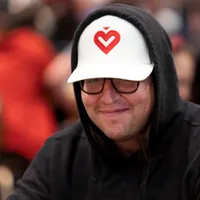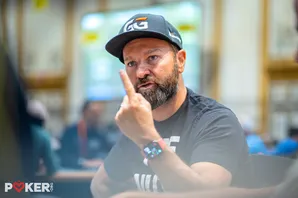The PokerGO Tour's first major tournament series of the year, the US Poker Open (USPO), brought the best of the best to the PokerGO Studio. Throughout the run of events, one player rose above the field to claim the overall series title. In a career that spans nearly a decade in poker, Aram Zobian has racked up nearly $5,000,000 in tournament earnings and is poised for a potential breakout year.
We spoke to him about all things USPO, his plans for the summer and the year ahead, plus his renewed faith in God and how he feels that translates to success on the felt.
Your USPO run was rather impressive: four cashes, four final tables, a third place finish, a runner-up, and one win. How do you feel now that you can look back on the win?
Aram Zobian: I feel great, I think the glow of it is going to last for a long time. I would consider it my biggest accomplishment in poker, even more important than winning an online bracelet or final-tabling the Main Event because those are just singular moments and this one was really special. I’m just really grateful. I never did have a proper celebration, so I think when a lot of my friends are back in town I’ll try to have a good get-together.
You joined quite the list of winners: Stephen Chidwick, Sean Winter, David Peters, Martin Zamani . How does it feel to be among such impressive company?
AZ: It’s cool, don’t get me wrong, but it doesn't actually mean that much. I ran really hot over a series. I played some of the best poker, I've got to give myself credit, but most of it just comes down to how the cards fall at the end of the day.
If I can do it again, great. If I can win a bracelet, or three or four, and sustain success at these high stakes then it'll prove something, but in an isolated situation, it's cool, but it doesn't actually mean that much.
You’ve had success in the PokerGO Studio and made big final tables prior to this, but did this feel like a breakout series for you?
AZ: Yeah, it does. I’ve yearned to play high stakes consistently for a long time, but bad habits, poor money management, and a number of other things blocked me from doing so. The last year or so I’ve really worked hard on myself and tried to work through my mind. Now that I’ve cleared a lot of obstructions I feel really ready to go at it.
It’s not always going to work out where you breakthrough and have an amazing moment, but if it’s meant to be then it’s meant to be. I feel like I’m meant to crush high stakes and play at a very high level.
How did you feel going into the $25,000 final table with the series title up in the air? You and Jesse Lonis were on the short stacks; what was your strategy for balancing the series title race with your performance at the final table?
AZ: Yeah, he had to win and I had to finish sixth or seventh. It was so unlikely at that point that I wasn’t worried about it at all. He has to get through [Stephen] Chidwick, sometimes we call him Officer Chidwick, Chewy [Andrew Lichtenberger] as well, Dan Smith. There were no weak links at that final table.
Honestly, whenever I was thinking about the points it just threw me off. The first day of the tournament, I kept looking up at the tournament clock to see how many entries and how many people are able to pass me with a first place finish. It did nothing for me.
Coming into the final table, I was like, ‘Okay, just play your cards.’ A lot of people asked if I had a game plan and I didn’t. I had a general idea because of stack distribution, but things change really fast and you have to be able to adjust. Seeing Jesse exit first was still a relief, though, it wouldn’t have been great to lose.
What’s next for you poker-wise? Do you have plans for a big summer at the WSOP? Are we going to see you back at any Triton stops in the coming years?
AZ: At the WSOP I’m going to play the biggest schedule I’ve played. That will probably entail me playing less events, just higher buy-ins. There’s a bunch of $25k tournaments, a few at the Wynn. I’ll likely play the $50k and $100k as well. I’d love to play the $250k, but that’s a different type of tournament, a different type of ROI.
Beyond that, I would love to play Triton, for sure. I think that’s a different level of pressure and competition. The first time I went, I realized just how good these guys are. I gained a lot of respect for those guys and I’m looking forward to battling and getting in there to prove that I can get it done in those environments.
Is there anyone in poker that you’ve taken cues from in how they play or that you’ve tried to model your success on?
AZ: Before we had a falling out of sorts, we were friends for a long time, and Ali Imsirovic actually had a huge influence on my game. He was probably the best player at one point and I really looked up to him in terms of how he viewed the game. He was a killer.
Also, Brock Wilson has had a huge influence, he helped me learn the late game stuff. He was ahead of the curve on that. And Justin Saliba. I’ve had various coaches - shoutout to Jonathan Jaffe and Nick Petrangelo - both excellent players that have helped me see the game on a totally different level. I think you can only get so far in poker on your own.
In a PokerGO interview you mentioned the role that your faith plays in your game. Can you expand a little on this for us?
AZ: Yeah, I would say faith has been really important as it relates to my life in poker because I've had periods of chasing the things that every young man desires. Having a fast car, having really good meals, talking to a lot of girls. And all those things led me to a place that was empty and without purpose.
Now I'm abstaining from a lot of worldly pleasures and I focus on what I believe to be God's will. It's brought me to a place of discipline. It's brought me to a place of consistency of routine. You know, my room is no longer clothes on the floor; the dishes are done. These are all just small things that reflect the inner nature and the desire to do right by God. All of that has really translated into feeling better at the table, feeling more clear headed, not having feelings of shame or guilt and fear.
I think what changed mostly was my demeanor and how I conducted myself at the table. I think a big thing for me is measuring my words and making sure to not speak too much nonsense or crack a lot of jokes. I came to realize that when you're trying to make a lot of jokes to make people laugh, you just focus on the self.
My mentor and I came up with this question: does this glorify God or deify the self? If I'm making a random comment to needle someone, I'm trying to make myself feel good.
It's helped me cut out a lot of the nonsense and focus on being kindhearted and respectful to all my opponents.
Images Courtesy of PokerGO/Antonio Abrego





















